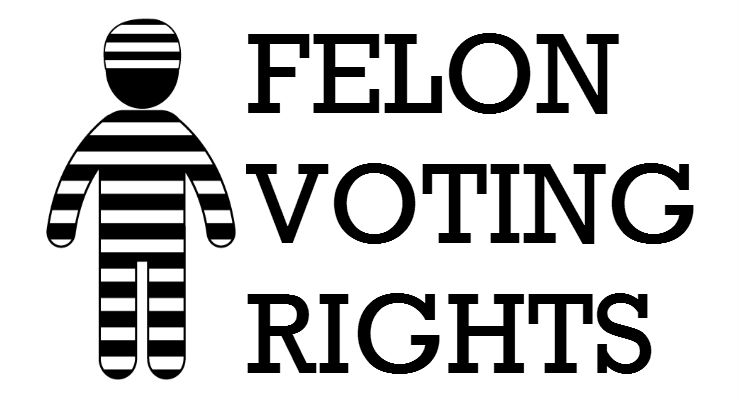
There are approximately 1.7 million Floridians whose right to vote has been stripped away: ex-felons. The disenfranchisement of felons in the state has silenced the voices of such a huge number of citizens that it impacts the balance of power in Florida and beyond. The latest news comes from a really interesting Orlando Sentinel article by Gray Rohrer:
A push by Florida Republicans to require ex-felons to pay all fines and restitution related to their sentence before getting their right to vote back is being denounced by Democrats and activists as a “poll tax” reminiscent of Jim Crow laws.
Republicans, meanwhile, argued fines and restitution were always considered to be part of the sentences felons had to complete, citing court arguments by voting rights advocates themselves. A Senate panel passed its version of the bill (SPB 7086) by a narrow 3-2 vote Monday, with Republicans in favor and Democrats against.
“I’m like a citizen again except that I still can’t vote,” said Karen Leicht, an ex-felon who served two years in federal prison for insurance fraud. “What am I if I can’t vote as a citizen in this country?” she added, likening the bill to a poll tax.
See the full story here. The restoration of felon voting rights is a controversial reform but the truth remains that mass incarceration and disenfranchisement is tied to the nation’s unique history of slavery. The Brennan Center for Justice at New York University’s School of Law has summarized the state of felon voting in Florida as follows:
Florida has the highest disenfranchisement rate in the country. It is one of three states, along with Iowa and Kentucky, to permanently bar all citizens with felony convictions from voting. Currently, Floridians can only regain the ability to vote if they individually apply to the state Office of Executive Clemency and their application is one of the few granted. The amendment would give Floridians who have already served their time a second chance at democratic participation.
The Brennan Center for Justice at NYU School of Law is a “nonpartisan law and policy institute that seeks to improve our systems of democracy and justice”. A landmark 2016 report, titled “Florida: An Outlier in Denying Voting Rights”, was written by Erika L. Wood, a Professor of Law at New York Law School and Director of the Voting Rights and Civic Participation Project of the Impact Center for Public Interest Law. It explained in stark terms:
Florida denies the right to vote to more of its residents than any state, and to the largest percentage of its voting-age citizens than any state. Nearly one-third of those who have lost the right to vote for life in Florida are black, although African Americans make up just 16 percent of the state’s population. Florida’s law disenfranchises 21 percent of its total African-American voting-age population. The breadth and depth of Florida’s disenfranchisement of its residents represent a radical departure from the norm in the United States, which is itself an outlier internationally.
Florida became the target of ridicule on the Emmy Award-winning HBO show “Last Week Tonight with John Oliver” not that long ago. Visit the official website for Last Week Tonight with John Oliver or watch the video below. The video is about 12 minutes. Take a look:
According to Article 1 Section 2 of the constitution of the State of Florida:
“All natural persons, female and male alike, are equal before the law and have inalienable rights, … No person shall be deprived of any right because of race, religion, national origin, or physical disability”.
The reality has not matched the rhetoric.
You can see more on this subject at either the Democracy Chronicles Felon Voting archive or African-American Voting Rights. Also see our main section on American Democracy and our Voter Access articles focusing more broadly on the ease of voting and the various barriers in the way.
Leave a Reply